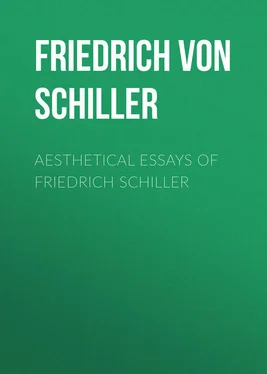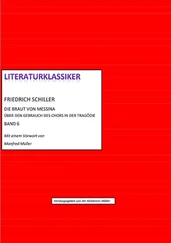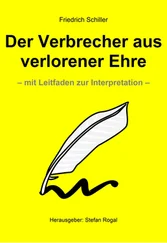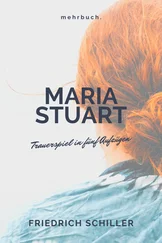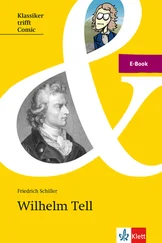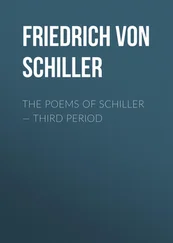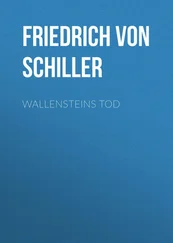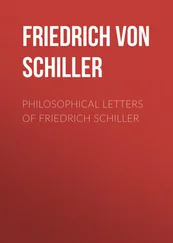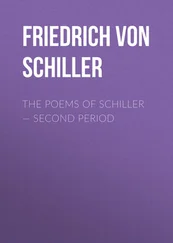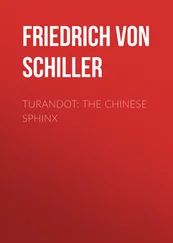Friedrich Schiller - Aesthetical Essays of Friedrich Schiller
Здесь есть возможность читать онлайн «Friedrich Schiller - Aesthetical Essays of Friedrich Schiller» — ознакомительный отрывок электронной книги совершенно бесплатно, а после прочтения отрывка купить полную версию. В некоторых случаях можно слушать аудио, скачать через торрент в формате fb2 и присутствует краткое содержание. Жанр: literature_18, foreign_antique, foreign_prose, на английском языке. Описание произведения, (предисловие) а так же отзывы посетителей доступны на портале библиотеки ЛибКат.
- Название:Aesthetical Essays of Friedrich Schiller
- Автор:
- Жанр:
- Год:неизвестен
- ISBN:нет данных
- Рейтинг книги:3 / 5. Голосов: 1
-
Избранное:Добавить в избранное
- Отзывы:
-
Ваша оценка:
- 60
- 1
- 2
- 3
- 4
- 5
Aesthetical Essays of Friedrich Schiller: краткое содержание, описание и аннотация
Предлагаем к чтению аннотацию, описание, краткое содержание или предисловие (зависит от того, что написал сам автор книги «Aesthetical Essays of Friedrich Schiller»). Если вы не нашли необходимую информацию о книге — напишите в комментариях, мы постараемся отыскать её.
Aesthetical Essays of Friedrich Schiller — читать онлайн ознакомительный отрывок
Ниже представлен текст книги, разбитый по страницам. Система сохранения места последней прочитанной страницы, позволяет с удобством читать онлайн бесплатно книгу «Aesthetical Essays of Friedrich Schiller», без необходимости каждый раз заново искать на чём Вы остановились. Поставьте закладку, и сможете в любой момент перейти на страницу, на которой закончили чтение.
Интервал:
Закладка:
The beautiful is thus, according to these later thinkers, the revelation of God to the mind through the senses; it is the appearance of the idea. In the beautiful spirit reveals itself to spirit through matter and the senses; thus the entire man feels himself raised and satisfied by it. By the unity of the beautiful with us we experience with delight that thought and the material world are present for our individuality, that they utter tones and shine forth in it, that both penetrate each other and blend in it and thus become one with it. We feel one with them and one in them.
This later view was to a great extent expressed by Schiller in his "Aesthetical Letters."
But art and aesthetics, in the sense in which these terms are used and understood by German philosophical writers, such as Schiller, embrace a wider field than the fine arts. Lessing, in his "Laocoon," had already shown the point of contrast between painting and poetry; and aesthetics, being defined as the science of the beautiful, must of necessity embrace poetry. Accordingly Schiller's essays on tragic art, pathos, and sentimental poetry, contained in this volume, are justly classed under his aesthetical writings.
This being so, it is important to estimate briefly the transitions of German poetry before Schiller, and the position that he occupied in its historic development.
The first classical period of German poetry and literature was contained between A. D. 1190 and 1300. It exhibits the intimate blending of the German and Christian elements, and their full development in splendid productions, for this was the period of the German national epos, the "Nibelungenlied," and of the "Minnegesang."
This was a period which has nothing to compare with it in point of art and poetry, save perhaps, and that imperfectly, the heroic and post-Homeric age of early Greece.
The poetical efforts of that early age may be grouped under – (1) national epos: the "Nibelungenlied;" (2) art epos: the "Rolandslied," "Percival," etc.; (3) the introduction of antique legends: Veldeck's "Aeneide," and Konrad's "War of Troy;" (4) Christian legends "Barlaam," "Sylvester," "Pilatus," etc.; (5) poetical narratives: "Crescentia," "Graf Rudolf," etc.; (6) animal legends; "Reinecke Vos;" (7) didactic poems: "Der Renner;" (8) the Minne-poetry, and prose.
The fourth group, though introduced from a foreign source, gives the special character and much of the charm of the period we consider. This is the sphere of legends derived from ecclesiastical ground. One of the best German writers on the history of German literature remarks: "If the aim and nature of all poetry is to let yourself be filled by a subject and to become penetrated with it; if the simple representation of unartificial, true, and glowing feelings belongs to its most beautiful adornments; if the faithful direction of the heart to the invisible and eternal is the ground on which at all times the most lovely flowers of poetry have sprouted forth, these legendary poems of early Germany, in their lovely heartiness, in their unambitious limitation, and their pious sense, deserve a friendly acknowledgment. What man has considered the pious images in the prayer-books of the Middle Ages, the unadorned innocence, the piety and purity, the patience of the martyrs, the calm, heavenly transparency of the figures of the holy angels, without being attracted by the simple innocence and humility of these forms, the creation of pious artists' hands? Who has beheld them without tranquil joy at the soft splendor poured, over them, without deep sympathy, nay, without a certain emotion and tenderness? And the same spirit that created these images also produced those poetical effusions, the same spirit of pious belief, of deep devotion, of heavenly longing. If we make a present reality of the heroic songs of the early German popular poetry, and the chivalrous epics of the art poetry, the military expeditions and dress of the Crusades, this legendary poetry appears as the invention of humble pilgrims, who wander slowly on the weary way to Jerusalem, with scollop and pilgrim's staff, engaged in quiet prayer, till they are all to kneel at the Saviour's sepulchre; and thus contented, after touching the holy earth with their lips, they return, poor as they were, but full of holy comfort, to their distant home.
"While the knightly poetry is the poetry of the splendid secular life, full of cheerful joy, full of harp-tones and song, full of tournaments and joyous festivals, the poetry of the earthly love for the earthly bride, the poetry of the legends is that of the spontaneous life of poverty, the poetry of the solitary cloister cell, of the quiet, well-walled convent garden, the poetry of heavenly brides, who without lamenting the joys of the world, which they need not, have their joy in their Saviour in tranquil piety and devout resignation – who attend at the espousals of Anna and Joachim, sing the Magnificat with the Holy Mother of God, stand weeping beneath the cross, to be pierced also by the sword, who hear the angel harp with St. Cecilia, and walk with St. Theresa in the glades of Paradise. While the Minne-poetry was the tender homage offered to the beauty, the gentleness, the grace, and charm of noble women of this world, legendary poetry was the homage given to the Virgin Mother, the Queen of Heaven, transfiguring earthly love into a heavenly and eternal love."
"For the twelfth and thirteenth centuries were the time of woman cultus, such as has never been before or since seen; it is also the time of the deepest and simplest and truest, most enthusiastic and faithful veneration of the Virgin Mary. If we, by a certain effort, manage to place ourselves back on the standpoint of childlike poetic faith of that time, and set aside in thought the materializing and exaggeration of the hagiology and Mariolatry produced by later centuries, rendering the reaction of the Reformation unavoidable – if now in our age, turned exclusively to logical ideas and a negative dialectic, we live again by thought in those ages of feeling and poetry – if we acknowledge all these things to be something more than harmless play of words and fancy, and as the true lifelike contents of the period, then we can properly appreciate this legendary poetry as a necessary link in the crown of pearls of our ancient poetry."
In short, the first classical period of German literature was a time of youthful freshness, of pure harmony, plunged in verse and song, full of the richest tones and the noblest rhythm, so that rhyme and song alone must be looked for as the form of poetic creations. Accordingly it had no proper prose. Like our own youth, it was a happy, free, and true youth, it knew no prose; like us it dreamed to speechless songs; and as we expressed our youthful language and hopes, woes and joys, in rhyme and song, thus a whole people and age had its beautiful youth full of song and verse tones. The life was poetry and poetry was the life.
Then came degeneracy and artifice; after that the great shock of the Reformation; subsequently a servile and pedantic study of classical forms without imbibing their spirit, but preparing the way for a truer art spirit, extracted from their study by the masterly criticism of Winckelmann and Lessing, till the second classical period of German literature and poetry bloomed forth in full beauty, blending the national and legendary elements so well expressed by Herder with the highest effusions of dramatic poetry, partly creative and partly imitative of the Greek models, in Schiller and Goethe.
Modern German literature presents a very remarkable spectacle, though far from unique in history, for there we see criticism begetting genius.
Lessing, the founder of the modern German drama, sought to banish all pomp from the theatre, and in doing so some critics have thought that he banished the ideal and fell into affectation. At any rate, his "Dramaturgy" is full of original ideas, and when he drew out the sphere of poetry contrasted with that of painting in his "Laocoon," all Germany resounded with his praise. "With that delight," says Goethe, "we saluted this luminous ray which a thinker of the first order caused to break forth from its clouds. It is necessary to have all the fire of youth to conceive the effect produced on us by the 'Laocoon' of Lessing." Another great contemporary, whose name is imperishable as that of art, struck a mortal blow at a false taste in the study of the antique. Winckelmann questioned the works of the Greek chisel with an intelligence full of love, and initiated his countrymen into poetry by a feeling for sculpture! What an enthusiasm he displayed for classical beauty! what a worship of the form! what a fervor of paganism is found in its eloquent pages when he also comments on the admirable group of the Laocoon, or the still purer masterpiece of the Apollo of Belvedere.
Читать дальшеИнтервал:
Закладка:
Похожие книги на «Aesthetical Essays of Friedrich Schiller»
Представляем Вашему вниманию похожие книги на «Aesthetical Essays of Friedrich Schiller» списком для выбора. Мы отобрали схожую по названию и смыслу литературу в надежде предоставить читателям больше вариантов отыскать новые, интересные, ещё непрочитанные произведения.
Обсуждение, отзывы о книге «Aesthetical Essays of Friedrich Schiller» и просто собственные мнения читателей. Оставьте ваши комментарии, напишите, что Вы думаете о произведении, его смысле или главных героях. Укажите что конкретно понравилось, а что нет, и почему Вы так считаете.
